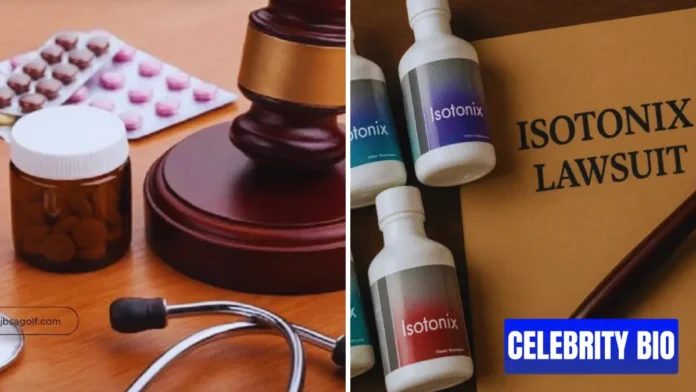Introduction
In recent years, dietary supplements have become an integral part of the health and wellness industry, with millions of people across the globe relying on powders, capsules, and drinks that promise to support vitality, digestion, immunity, and more. Among the many names in this booming market, Isotonix Lawsuit has stood out as a brand offering powdered supplements with a unique delivery system that claims to help the body absorb nutrients more effectively. However, the growing interest in the brand has also been met with increasing scrutiny, culminating in what has become widely known as the Isotonix lawsuit.
The phrase has been circulating across news outlets, legal blogs, and wellness forums, prompting both loyal customers and sceptical observers to ask: what really happened, and why does this lawsuit matter? For some, it raises concerns about whether supplement companies are making promises that cannot be backed up by science. For others, it is a reminder of the legal and ethical challenges within an industry that often sits in a grey zone of regulation.
This article will break down the Isotonix lawsuit in detail: the brand’s background, the claims brought forward, expert perspectives, and most importantly, what consumers can learn to protect themselves when purchasing health products. By the end, you’ll have a clear understanding not only of this case but also of the wider landscape of supplement controversies.
Understanding the Isotonix Brand
Isotonix is a line of dietary supplements sold primarily through Market America, a multi-level marketing (MLM) company that distributes a wide range of wellness and lifestyle products. The brand’s selling point lies in its claim to offer a liquid supplement delivery system that mimics the body’s natural fluids, allegedly allowing for faster and more efficient absorption of vitamins and minerals.
These supplements cover a wide range of needs, from multivitamins and digestive enzymes to antioxidant blends. Marketing materials often highlight scientific-sounding language, which appeals to consumers looking for health solutions that appear modern and credible. The products have become especially popular in North America, Europe, and Asia, with strong marketing campaigns led by distributors who earn commissions based on sales.
But with popularity comes scrutiny. As Isotonix Lawsuit gained traction, questions began to emerge about whether its health claims were supported by credible scientific evidence, and whether the distribution model itself raised ethical or legal concerns. These questions eventually converged into legal challenges that brought the brand under the spotlight.
What Sparked the Isotonix Lawsuit?
The origins of the Isotonix lawsuit can be traced back to concerns raised by both consumers and regulatory watchdogs. Allegations suggested that the company may have engaged in misleading advertising by exaggerating the health benefits of its supplements. In addition, issues were raised about the multi-level marketing structure used to distribute the products, which some critics compared to pyramid schemes.
The lawsuit centred on claims that consumers were misled into believing that Isotonix Lawsuit products could deliver results that were not supported by rigorous scientific research. Furthermore, the legal action questioned whether distributors were properly trained and whether the promises made during marketing presentations aligned with regulatory standards.
As the case gained visibility, it attracted more attention from journalists, nutrition experts, and industry analysts who began examining not just the brand but the broader trend of health supplement companies facing similar legal hurdles.
Legal Claims and Core Issues
At the heart of the Isotonix lawsuit were three primary allegations:
- Misleading Advertising: It was claimed that the company promoted health benefits without sufficient scientific backing, raising concerns about false or exaggerated marketing.
- Questionable Health Benefit Claims: Supplements were allegedly advertised as being superior due to their absorption technology, but critics argued that these claims lacked peer-reviewed evidence.
- Distribution and MLM Concerns: The multi-level marketing model raised suspicions of predatory practices, with distributors encouraged to recruit others rather than focus purely on product sales.
These issues were not unique to Isotonix Lawsuit but reflected wider tensions within the supplement industry. Many companies walk a fine line between promotional enthusiasm and regulatory compliance, and this case highlighted how easily those lines can blur.
Consumer Complaints and Experiences
Beyond the legal filings, one of the most powerful forces behind the lawsuit was the voice of consumers. Many customers expressed disappointment that the products did not deliver the promised results, while others felt misled by bold marketing campaigns. Online reviews revealed mixed experiences: while some users swore by the supplements, others reported no noticeable changes in their health.
Several complaints centred around the high cost of the products, which made the lack of clear results even more frustrating. Others pointed to aggressive sales tactics, with distributors often pressuring friends or family into purchasing products. In some cases, customers claimed they were persuaded to spend large sums on supplements without being given accurate information about potential benefits.
Taken together, these complaints painted a picture of frustration that added weight to the lawsuit’s claims and intensified public debate.
Regulatory Framework in the UK and Abroad
One of the reasons supplement lawsuits like this resonate so strongly is the patchy nature of regulation. In the United Kingdom, dietary supplements are overseen by the Food Standards Agency (FSA) and must comply with EU and UK food law. However, unlike pharmaceutical drugs, supplements do not undergo rigorous clinical testing before reaching the market.
In the United States, oversight falls to the Food and Drug Administration (FDA), but the FDA does not pre-approve supplements for safety or effectiveness. Instead, it intervenes only when complaints or safety issues arise. Meanwhile, in Europe, the European Food Safety Authority (EFSA) plays a role in assessing health claims, but enforcement can vary across member states.
This fragmented regulatory environment makes it difficult to ensure consistency, and it often leaves consumers vulnerable to misleading claims. The Isotonix lawsuit underscored the importance of these regulatory gaps and how companies can sometimes exploit them.
Expert Opinions on the Isotonix Lawsuit
Legal professionals analysing the case noted that supplement lawsuits are notoriously complex. Unlike pharmaceutical claims, which can be tested against clinical data, supplement claims often hinge on vague promises of “supporting” health. This ambiguity makes it difficult to prove or disprove marketing statements in court.
Nutritionists and scientists added another layer of critique, pointing out that while certain vitamins and minerals are undoubtedly essential, the body already has efficient mechanisms for absorption. They questioned whether Isotonix’s delivery system was as revolutionary as advertised.
Industry analysts, meanwhile, warned that lawsuits like this can damage consumer trust not just in one brand but across the entire supplement sector. When one high-profile company faces legal trouble, it raises doubts about the credibility of others.
Financial and Brand Impact
The lawsuit inevitably had financial consequences for Isotonix Lawsuit and its parent company. Reports indicated a dip in consumer confidence, with distributors struggling to reassure their customer bases. Competing supplement brands seized the opportunity to highlight their own transparency and scientific backing, capitalising on the controversy.
For a brand so reliant on reputation and word-of-mouth, the damage extended beyond sales figures. In multi-level marketing systems, the enthusiasm of distributors is a crucial driver of revenue. Any legal shadow dampens that enthusiasm, creating a ripple effect across the business.
What Consumers Should Learn from the Isotonix Lawsuit
The most valuable outcome of the Isotonix lawsuit may be the lessons it offers to everyday consumers. Here are key takeaways:
- Check for Scientific Evidence: Look for peer-reviewed studies, not just company-funded claims.
- Understand Regulatory Limits: Remember that supplements are not tested like medicines.
- Be Wary of Exaggerated Promises: Any product claiming to be a “miracle” should be approached cautiously.
- Evaluate the Sales Model: If the focus seems more on recruitment than the product, it could be a red flag.
- Read Reviews Critically: Balance positive testimonials against critical feedback.
By applying these principles, consumers can protect themselves from disappointment and make better-informed health decisions.
Wider Trends in Supplement Lawsuits
Isotonix Lawsuit is not alone in facing legal scrutiny. Other supplement companies, both in the UK and abroad, have faced lawsuits over misleading advertising, unsafe ingredients, or unethical sales tactics. High-profile cases often follow similar patterns, where ambitious marketing collides with the reality of regulatory standards and scientific evidence.
These cases reflect broader consumer trends. With wellness culture booming, people are more willing than ever to invest in supplements. At the same time, they are becoming more aware of the need for transparency and accountability. As such, lawsuits are not only legal events but also cultural signals of shifting expectations.
The Future of Isotonix
The road ahead for Isotonix Lawsuit will depend heavily on how the company addresses the allegations. If settlements are reached or corrective measures are implemented, it may be possible for the brand to rebuild trust over time. Transparency, stronger scientific backing, and a more responsible marketing approach could help recover its reputation.
However, scepticism will remain. In industries built on trust, regaining consumer confidence is far more difficult than losing it. The company’s response to the lawsuit may set a precedent not only for its own survival but also for how other supplement brands navigate similar challenges.
Frequently Asked Questions (FAQs)
What is the Isotonix lawsuit about?
The lawsuit revolves around claims of misleading advertising, questionable health benefits, and concerns about the company’s multi-level marketing model.
Is Isotonix Lawsuit safe to use?
Most supplements are considered safe when used appropriately, but the controversy focuses more on whether the health claims are scientifically supported.
Will customers receive compensation?
This depends on the outcome of the case and whether settlements are reached. In many lawsuits, refunds or partial compensation may be offered.
Are all supplement brands at risk of lawsuits?
Not all, but many face scrutiny if their claims are exaggerated or if they operate under controversial sales models. Transparency and evidence-based marketing reduce the risks.
Conclusion
The Isotonix lawsuit has become more than just a legal dispute; it is a symbol of the growing demand for honesty and accountability in the health supplement industry. For consumers, it is a reminder to look beyond glossy marketing and to question whether claims are backed by real science. For companies, it highlights the urgent need to align promotional enthusiasm with ethical and regulatory standards.
As the wellness market continues to expand, such lawsuits will likely remain part of the landscape. But informed consumers, armed with knowledge and scepticism, can navigate this space with greater confidence. Whether you are an Isotonix customer or simply curious about the world of supplements, the key takeaway is clear: ask questions, seek evidence, and never take marketing at face value.

